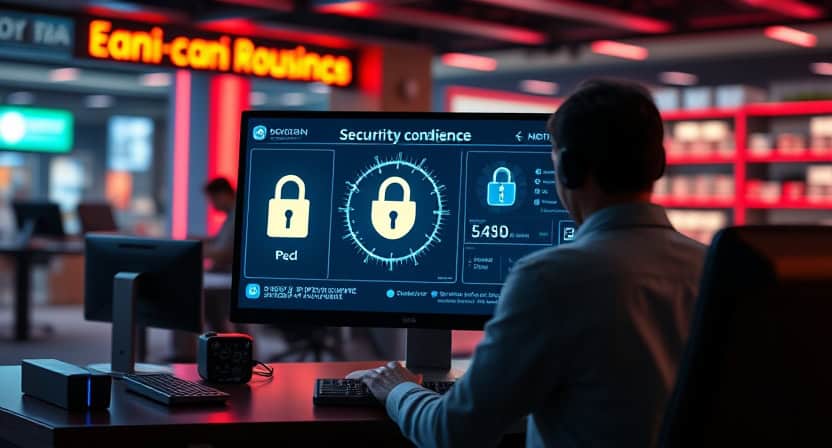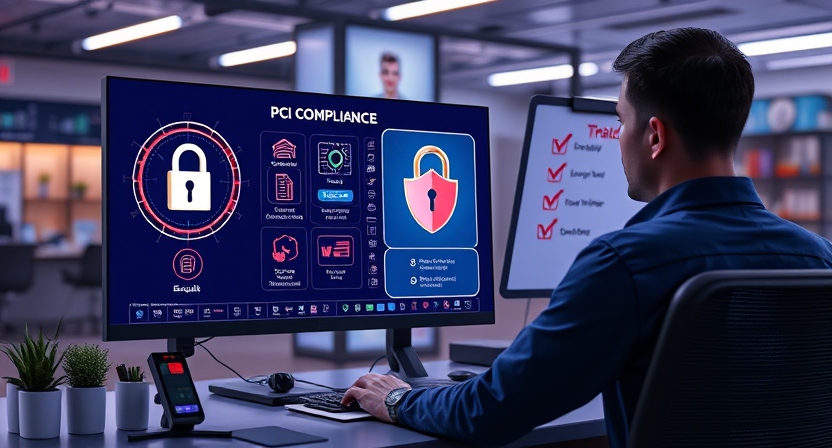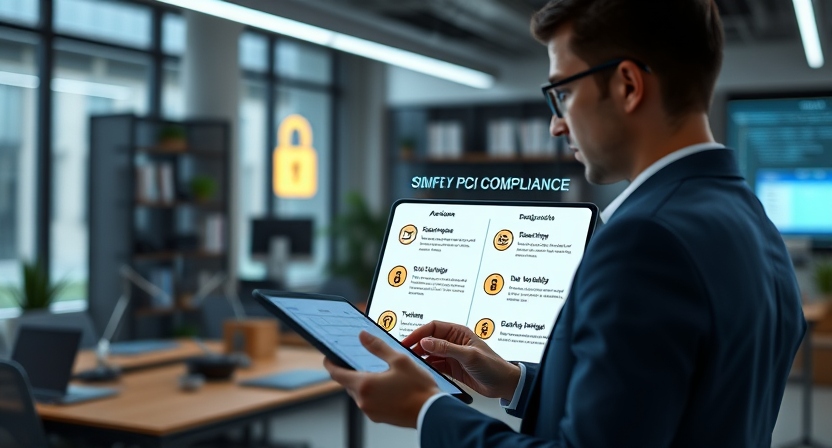
By Barbara Thomas December 7, 2024
Ensuring the safety of payment transactions is now essential, not just a choice. As companies become more dependent on digital payment solutions, the necessity to safeguard confidential customer information has surged significantly. PCI compliance, regulated by the PCI DSS, is an essential structure that guarantees companies manage cardholder information safely. Following these compliance regulations not only shields your customers but also protects your business from financial and reputational harm.
Why PCI Compliance Matters in Today’s Digital Landscape

With the rise of e-commerce and online transactions, the volume of credit card payments has surged. This growth has also attracted cybercriminals looking to exploit vulnerabilities in payment systems. PCI compliance is essential because it creates a standardized set of security practices to protect cardholder data, ensuring businesses operate securely.
Not adhering to PCI DSS can lead to significant repercussions. Companies face significant fines, loss of payment processing rights, and potential legal proceedings. Even more harmful is the erosion of customer trust, which can prove challenging to restore following a breach. Adherence to PCI standards shows that your company prioritizes payment security and actively works to safeguard customer information.
In addition to protecting your customers, PCI compliance helps businesses prevent data breaches, avoid fraud, and maintain their reputation. It is not just a regulatory box to tick; it is a commitment to creating a secure environment for transactions and building long-term trust with customers.
Understanding PCI Compliance: The Basics

PCI compliance applies to any business that processes, stores, or transmits credit card information. Whether you’re a large enterprise or a small retailer, if you accept credit card payments, you must adhere to PCI DSS. These standards were established by major card networks like Visa, Mastercard, and American Express to protect cardholder data across all payment channels.
The PCI DSS requirements aim to address six main objectives: creating secure networks, safeguarding stored information, maintaining a vulnerability management strategy, applying access controls, overseeing systems, and upholding security policies. Every goal encompasses particular measures, including setting up firewalls, encrypting data, and limiting access to confidential information.
PCI compliance is not static. It requires regular assessments, updates, and audits to keep up with evolving threats. Businesses must remain vigilant, ensuring their security practices meet current standards to stay compliant and protect their customers’ sensitive information.
Key Security Measures Required for PCI Compliance

Meeting PCI compliance involves implementing several security measures that protect cardholder data at every stage of its lifecycle. One critical aspect is the use of secure networks. Businesses must establish firewalls and ensure that default settings on devices, such as passwords, are replaced with secure credentials.
An additional key requirement is the encryption of cardholder information. Whenever payment information is saved or sent, it needs to be encrypted to prevent access by unauthorized individuals. Tokenization is an extensively utilized technology that substitutes sensitive information with distinctive tokens, thereby improving data security https://buycardmachines.com/can-high-risk-merchants-use-a-cash-discount-program/.
Controlling access is another crucial component. PCI DSS requires that only permitted personnel can access payment information, and companies need to enforce robust measures such as multi-factor authentication. It is also essential to have monitoring systems for vulnerabilities and to carry out regular testing in order to detect and resolve possible weaknesses.
Finally, maintaining a security policy ensures that all employees are aware of their responsibilities in protecting customer data. By following these measures, businesses can create a robust security environment that aligns with PCI DSS requirements.
Challenges Businesses Face in Achieving PCI Compliance

While PCI compliance is crucial, businesses often encounter challenges in implementing and maintaining it. SMBs, in particular, struggle with resource constraints. Compliance can be costly, requiring investment in secure infrastructure, ongoing audits, and skilled IT personnel.
The complexity of PCI DSS standards can also be overwhelming, especially for businesses without dedicated security teams. The technical requirements, such as encryption protocols and vulnerability management, require specialized knowledge. Many businesses also face difficulties in keeping up with updates to PCI standards and addressing emerging cyber threats.
Moreover, companies frequently depend on external service providers for payment processing. Making sure that these partners also meet PCI compliance introduces an additional level of complexity. In spite of these obstacles, companies can surmount them by focusing on compliance and utilizing outside expertise when necessary.
Practical Tips for Simplifying PCI Compliance

Achieving PCI compliance may seem daunting, but there are practical steps businesses can take to simplify the process. Conducting a risk assessment is a good starting point. This involves identifying vulnerabilities in your systems and addressing them systematically.
Utilizing payment processors that are PCI-compliant can likewise lessen the compliance burden. These providers manage numerous security needs, enabling companies to concentrate on different areas of their operations. Training employees holds equal significance. Educating employees on security best practices aids in avoiding errors that might jeopardize payment security.
Maintaining documentation is another essential practice. Keeping detailed records of security protocols, audits, and incident response plans not only facilitates compliance but also demonstrates accountability during assessments. By integrating these practices into daily operations, businesses can achieve compliance without undue stress.
The Role of Technology in Ensuring PCI Compliance

Technology is crucial in assisting businesses in achieving PCI compliance standards. Automated systems for oversight and documentation can streamline the compliance procedure by detecting weaknesses and creating comprehensive reports for evaluations. Encryption and tokenization methods safeguard cardholder information, minimizing the chances of breaches.
Cloud-based solutions are also transforming compliance management. These platforms offer scalable security features, making them particularly beneficial for SMBs with limited resources. Additionally, advancements in AI enable real-time threat detection, providing businesses with the ability to respond quickly to potential attacks.
By leveraging these technologies, businesses can streamline their compliance efforts, enhance data protection, and stay ahead of emerging security threats.
Looking Ahead: The Future of PCI Compliance and Cybersecurity

As the digital payment landscape continues to evolve, so does the need for robust security measures. PCI DSS is regularly updated to address new challenges, such as the rise of mobile payments and cryptocurrency transactions. Businesses must stay informed about these changes and adapt their practices accordingly.
Taking the initiative to invest in cybersecurity beyond just compliance is essential. Although PCI compliance offers a solid basis, companies should also explore extra measures, including endpoint security and ongoing threat monitoring, to safeguard their systems. The future of payment security depends on fostering a culture of security awareness and utilizing cutting-edge technologies to tackle advanced cyber threats.
Conclusion

PCI compliance is more than a regulatory requirement—it is a vital component of modern business operations. By adhering to PCI DSS, businesses can protect sensitive customer data, prevent breaches, and build trust. While the path to compliance can be challenging, it is a necessary investment in the long-term success of your business.
As the payment environment keeps changing, focusing on payment security and data protection will help your business stay competitive and strong against cyber threats. Start today by integrating PCI compliance into your operations.